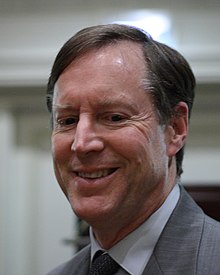Theodore Porter
Theodore Porter | |
|---|---|
 Porter at the 2007 History of Science Society meeting | |
| Born | Theodore M. Porter 1953 (age 70–71) |
| Nationality | American |
| Education | Stanford University (AB) Princeton University (PhD) |
| Occupation | Historian |
| Awards | George Sarton Medal (2023) |
Theodore M. Porter (born 1953) is a professor who specializes in the history of science in the Department of History at UCLA. He has authored several books, including The Rise of Statistical Thinking, 1820-1900; and Trust in Numbers: The Pursuit of Objectivity in Science and Public Life, the latter a vast reference for sociology of quantification.[1][2] His most recent book, published by Princeton University Press in 2018, is Genetics in the Madhouse: The Unknown History of Human Heredity. He graduated from Stanford University with an A.B. in history in 1976 and earned a Ph.D. from Princeton University in 1981. In 2008, he was elected to the American Academy of Arts and Sciences.[3] In 2023, he received the George Sarton Medal for lifetime achievement from the History of Science Society.[4]
Works
[edit]- The Rise of Statistical Thinking (1986)[5]
- Trust in Numbers: The Pursuit of Objectivity in Science and Public Life (1995)[6] 2020 pbk edition.
- The Modern Social Sciences, as editor with Dorothy Ross (2003)[7]
- Karl Pearson: The Scientific Life in a Statistical Age (2004)[8]
- Genetics in the Madhouse: The Unknown History of Human Heredity (2018)[9] 2020 pbk edition.
External links
[edit]Notes and references
[edit]- ^ E. Popp Berman and D. Hirschman, “The Sociology of Quantification: Where Are We Now?,” Contemp. Sociol., vol. 47, no. 3, pp. 257–266, 2018.
- ^ Mennicken, A., & Espeland, W. N. (2019). What’s New with Numbers? Sociological Approaches to the Study of Quantification. Annual Review of Sociology, 45(1), 223–245.
- ^ Faculty Elected to American Academy of Arts and Sciences — History Archived 2008-07-26 at the Wayback Machine
- ^ Sepkoski, David (July 20, 2023). "2023 Sarton Medalist: Ted Porter". History of Science Society. Retrieved November 7, 2023.
- ^ Daston, L. (1987). The Rise of Statistical Thinking, 1820-1900 by Theodore M. Porter. Isis, 78, 272–274.
- ^ Ravetz, J. R. (1997). In Numbers We Trust | Issues in Science and Technology. Issues in Science and Technology, 13(2). Retrieved from https://issues.org/ravetz/
- ^ Hands, D. Wade (September 2005). "Book Review: The Cambridge History of Science, Volume 7: The Modern Social Sciences, edited by Theodore M. Porter and Dorothy Ross". Journal of the History of Economic Thought. 27 (3): 355–357. doi:10.1017/S1053837200008877.
- ^ Turner, Frank M. (2005). "review of Karl Pearson: The Scientific Life in a Statistical Age by Theodore M. Porter". The American Historical Review. 110 (3): 872–873. doi:10.1086/ahr.110.3.872.
- ^ Carter, N. (2020). Genetics in the madhouse: the unknown history of human heredity. Disability & Society, 35(4), 691–692.
